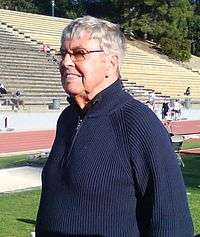Jim Bush

Jim Bush (born September 15, 1926 in Cleveland, Ohio) is a National Track and Field Hall of Fame[1] track and field coach. He is known primarily for his coaching tenure at the University of California, Los Angeles from 1965 to 1984. During that time, his teams won five NCAA Men's Outdoor Track and Field Championships (1966, 1971, 1972, 1973, 1978 (tied with UTEP) and he coached as many as 30 Olympians.
A 1947 graduate of Fullerton Union High School and a 1951 graduate of the University of California, Bush coached for 53 years at; Bakersfield College and Occidental College before arriving at UCLA.[2] He continued coaching at crosstown rival University of Southern California and other individual athletes after leaving UCLA. He also was a speed advisor to Los Angeles professional teams including the Dodgers, Kings, Lakers and Raiders.[3] His work with Raiders and their star Marcus Allen earned him a Super Bowl ring. He also has a World Series ring with the LA Dodgers baseball team and an NBA championship ring with the LA Lakers basketball team. He narrowly missed an National Hockey League ring with the LA Kings when they placed second place.
Among the athletes he coached in that time were Wayne Collett, Benny Brown, Greg Foster, Willie Banks, John Brenner and Quincy Watts. He famously kicked then world record holder Dwight Stones off of his team when Stones wanted to limit his participation to three meets.[3] He was the head coach of the United States team at the 1979 Pan American Games.
He was elected into the TAC (now called the USATF) National Track and Field Hall of Fame in 1987.[1] He is also a member of the Fullerton High School, Kern County, Bakersfield College, Occidental College, UCLA, Mt. SAC Relays and the United States Track Coaches Association Halls of Fame[4] (an organization he was previously president of). The Southern California Association USATF Championship meet is named in his honor,.[2] as is the championship award for the 110 metre hurdles at that meet.[5]
References
- 1 2 http://www.usatf.org/HallOfFame/TF/showBio.asp?HOFIDs=26
- 1 2 http://www.scausatf.org/events/opentrack.htm
- 1 2 http://masterstrack.com/2010/11/16538/
- ↑ http://www.ustfccca.org/ustfccca-hall-of-fame/ustfccca-hall-of-fame-class-of-1996/jim-bush-ustfccca-class-of-1996
- ↑ http://www.scausatf.org/events/open_jimbush/awards.htm